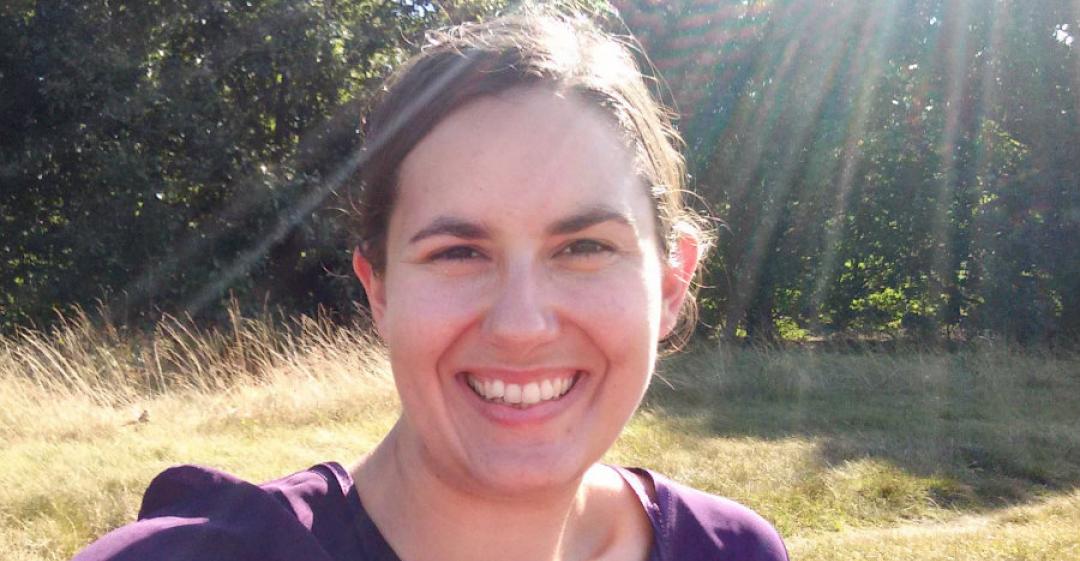“It rarely feels like 'work'; it's more like an extension of my play time.”

What work were you doing previously?
I was working in a gym aimed at 'people who hate gyms'.
What are you doing now?
I'm a self-employed personal trainer – although I use the job title 'Healthy Lifestyle Mentor' because it better describes what I do.
I believe that being fit and healthy isn't just about exercise (as many people think); just as important are nutrition and your relationship with food, your mental and social well-being, your quality of sleep, your ability to relax and having the tools you need to navigate life with a smile on your face.
Why did you change?
I was increasingly dissatisfied in my job at the gym, but also inspired by the work itself.
I felt I could go one step further in helping 'non-fitness-y' people (who don't like gyms, have tried all the diets, and have little or no faith in their ability to be fit and healthy) by taking the fitness sessions to them.
When was the moment you decided to make the change?
I'd idly considered it for months, but when I was very upset by something at work a couple of years ago, that's when it started to seem like a viable alternative.
Three months later, I decided this was what I needed to do. Another three months later, I handed in my notice, and within a week of finishing working at the gym, I started my Personal Trainer course.
Are you happy with the change?
Yes, absolutely!
I love being my own boss and managing my own time. And I feel fulfilled seeing the positive impact my work has on my clients in all areas of their lives.
My natural predilection for eating healthily, spending time outdoors and generally living the best life I can means that my knowledge and experience grows organically without me even really thinking about it. So, it rarely feels like 'work'; it's more like an extension of my play time.
What do you miss and what don't you miss?
I miss the camaraderie of having colleagues to chat with, the structure of being told what to do / what not to do, receiving feedback from your boss about your work, and the security of a regular pay cheque.
However, I've made up for all of that by having other self-employed friends for camaraderie, creating my own structure and 'reward chart' for the work I do, and I'm working on getting a more stable income stream.
How did you go about making the shift?
I researched what I would need in terms of qualifications.
Although you're not legally obligated to be qualified to be a personal trainer, it's recommended and provides a level of security for both you and your clients. You can also receive the support of the Register of Exercise Professionals and it's easier to arrange things like insurance.
I looked into the different courses available and found an intensive six-week course that met my needs. I signed up, paid my money and wrote my letter of resignation to the gym. I then undertook six weeks of intensive training and assessment.
I allowed myself a break, since Christmas was fast approaching, and then started creating my business in earnest in the new year – building a website, etc. I started off by offering free sessions to a group of hand-selected friends so I could practise on them and build my confidence, which I'm so glad I did. Unexpectedly, quite a lot of them decided to continue with me and paid for further sessions! Then, mostly through referrals, I started to get my first 'real' paying clients just a couple of months later.
What didn't go well? What 'wrong turns' did you take?
Nothing went especially badly, partly due to luck and partly due to lots of planning and preparation on my part.
It would have made life marginally easier if I'd set my official start date (which you have to tell HMRC when you register for a tax code) to coincide with the beginning of the tax year, but that wasn't a major problem.
I discovered that I didn't like teaching group sessions, so I now stick to the one-to-one format, but I count that as a natural evolution rather than an error.
How did you handle your finances to make your change possible?
I was fortunate that I had enough in savings to pay for the initial outlay of £3,000 for my training course.
I'm also fortunate to be supported by my boyfriend who helps with everyday bills and rent while I'm building up my income. I broke even within a year (i.e. earned enough to cover the amount I'd already spent) and am aiming to earn enough to make a decent living within the next couple of years.
What was the most difficult thing about changing?
The self-doubt.
In my personal life I was a pretty confident, self-aware and happy person after many years of self-development, counselling, coaching, etc. It was a surprise to find myself thinking anxious thoughts and feeling panicky in a way I hadn't experienced for years. When there's no one else there to tell you if you're doing it right or wrong, it's very easy to assume you just have no idea what you're doing, you're a fraud, it's all going to fail, and to wonder what on earth made you think you could do something like this.
One thing that helped immensely was taking the online Thrive course with Primal Happiness, which taught me a totally new way of seeing those anxious thoughts, and that I didn't have to go down that rabbit hole of despair and self-doubt.
What help did you get? 
My local small business support centre, Colbea (Colchester Business Enterprise Agency) provided free and low-cost workshops and training courses.
For £60 I attended a ten-week course called 'Small Steps, Big Changes', aimed at helping women to start their own businesses. The course helped to answer and clarify a lot of issues I had questions about, and more than that, gave me the confidence to believe that I could actually do this.
What resources would you recommend to others?
I did my training with Premier Global, and I'd recommend them for any aspiring gym instructors or personal trainers.
The HMRC website has lots of information about how to sort out your taxes (but you might need a patient friend to read through it with you in case you start feeling overwhelmed!).
Colbea (in Colchester) or your local small business agency can provide training and support.
What have you learnt in the process?
That it's actually a lot easier to start a business than I thought it was, but you absolutely need to believe in the thing you're doing or you'll just be forcing something that isn't meant to be, and your mental health will suffer.
At my lowest points I just reminded myself why I believe in taking health and fitness to 'non-fitness-y' people, and what I was hoping to achieve. That kept me going.
What would you advise others to do in the same situation?
Find people who are already running their own small businesses to ask for advice and encouragement.
Look up your own small business advisory centre (they're everywhere) to see what courses and assistance they can offer. If in doubt, Google it!
You don't have to spend loads of money to create the perfect website, flyers, etc., at the beginning; just use free and cheap resources and do the absolute minimum to get started, otherwise you'll get stuck in the preparation phase and never actually begin. You can buy / develop / improve everything later on (it's a constant evolution!). Don't be afraid to experiment with things that might not work, and bin them if they're rubbish.
Don't neglect your own mental health – you need to take time out to relax and switch off, and if you think you'd benefit from life or business coaching, counselling or self-help then give it a try.
Be kind to yourself – don't expect to get everything right the first time, and remember that everyone started off not knowing what they were doing.
To find out more about Madelyn's work, visit www.thewrightfit.wordpress.com.
Also, find out more about Premier Global in our Retraining Directory.
What lessons could you take from Madelyn's story to use in your own career change? Let us know in the comments below.



